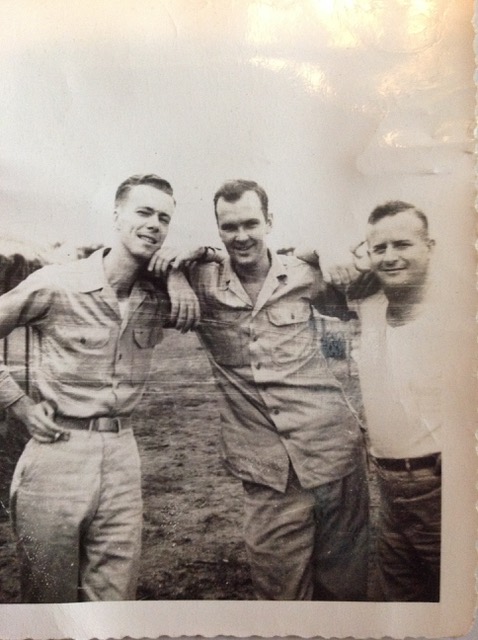Core Values and The Metal Highway

My Grandfather, Values, and Surviving WWII Flights Over “The Hump”
During the summer of 1942, my paternal grandfather, George Harvey, was inducted into the U.S. Army where he was assigned to the United States Army Air Forces. (At that time the U.S. Air Force had yet to become a separate military branch and was under the control of the Army). After completing basic and secondary training, George was sent to the radio operator school in Madison, Wisconsin. By early 1943, found himself stationed at A.P.O. #47 in Sookerating, India.

U.S. Army Air Forces airman George Harvey (far right) and several thousand other airmen flew a dangerous route called “The Hump” across the Himalayas during WWII.
Northern India was a strategically critical operational center during the Second World War and served as home of the U.S. Army Air Force Ferrying Command, later known as Air Transport Command (ATC). The ATC’s mission was straightforward: Keep Generalissimo Chiang Kai-shek’s forces in China supplied with all manner of matériel so that he and his army could continue taking the fight to their Japanese occupiers.
The ATC ran the first-ever strategic airlift, and their route across the Himalayan Mountains was known by flight crews assigned to that seemingly never-ending and dangerous mission as “The Hump.” It was also known as “The Metal Highway.”
By the end of 1943, 84,000 military personnel supported the operation, and a supply flight landed in China every two minutes. The human cost was high, though, with the survival rate for the flight crews one of the worst ever. Yet week in and week out, my grandfather and several other thousand other airmen suited up for a trip that might very well be one-way only.
The Connection Between Purpose and Personal Values
Throughout my life, I’ve often reflected on what my grandfather’s existence was like during his time flying The Hump and living in what he and other folks referred to as the “Big Sweat.” What would it be like to be told that you must go live in a foreign land to perform an extremely dangerous job? Oh, and by the way, your assignment will be open-ended—Uncle Sam will tell you when you can go home.
I have some limited insight into my grandfather’s war experience from our conversations and the letters in our family archive. He was an extremely kind and gentle man who understood what he valued and why. In essence, he understood his values.
George’s understanding of what mattered carried him through his life abroad and back home. His values enabled him to see himself as part of a larger purpose-driven mission, accept his role in the larger struggle, and assume the risk inherent with that mission.
Make no mistake, though. His understanding and acceptance of the larger purpose and mission were only made possible by his personal values. Others that didn’t possess that level of understanding had a far different experience at A.P.O. #457 in Assam, India.
How Personal Values Affect Your Organization
Why have I shared this story with you? It’s unlikely that your organization is requiring the kind of sacrifice known to those who flew The Hump. It is extremely likely, however, that everyone working for you has their own set of values. And because of that, I have three questions for you.
- Does your organization have a codified set of values that it lives by?
- Are you making it easy for individuals to see and understand your organization’s values?
- Are you purposefully recruiting and retaining individuals whose values align with those of your organization?
Every individual has their own set of values. And every individual is looking outside of themselves to catch glimpses of what they value. If your organization has core values and is purposefully looking for individuals that align with them, then you’re making it easy for people to see themselves as part of your mission. When an individual’s values align with their organization, amazing possibilities can spring to life. Yet far too often, organizations either don’t have core values, only pay lip service to them, or make it difficult for people to see themselves within the organization’s values.
What Can You Do About It?
Here’s my advice to you. Stop it now. Stop pretending that your organization can succeed without developing and living by core values. Stop accepting behavior that isn’t aligned with your core values. Stop living in fear. And stop blaming the “talent shortage,” lack of qualified employees, or some other external issue for your organization’s inability to reach its potential.
Developing and living core values is hard. Yet if you “do the core values thing,” and do it well, I guarantee it will provide you with a competitive advantage. That’s because too many organizations take one look at core values and either run the other way or slap them on a poster to check that “to-do item” off their list. If you want a meaningful culture with a “secret sauce,” then taking core values seriously is an essential part of that recipe.
Reflect and Get Real
My grandfather passed away many years ago, but I’d like to think that he’d stamp this article with his seal of approval. I think he’d approve of it because this topic is meaningful, personal, and real. At the end of each day, people crave to be a part of something that’s meaningful and genuine. They want to be in an environment that resonates with their values and enables them to embrace a larger mission—even a dangerous one like flying The Hump.
If you’re ready to get meaningful and real with your organization’s core values, give me a call. While we may not fly over the Himalayas, I guarantee we’ll reach new heights together.
